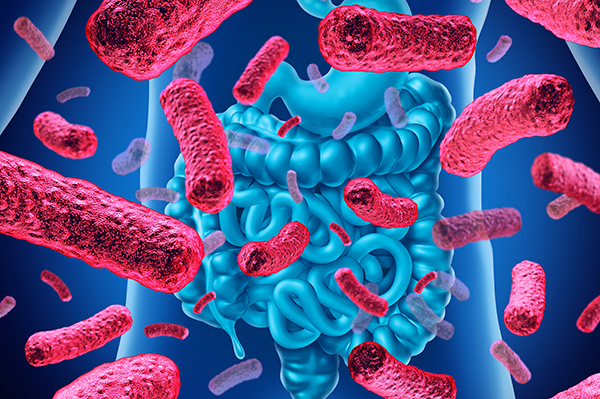Library
Subscribe
Top Tips for a Healthy Microbiome
Published on Wed Sep 5, 2018 - 3 min read

The microbiome refers to all of the microbes that live in and on the human body. Bacteria live on all parts of our body that are exposed to the environment but primarily reside in our gut where they can get a constant supply of food. When you add them up human cells make up only 43% of the body’s total cell count; the rest are all the bacteria, viruses, fungi, yeast, and archaea that colonize us1.
Over the last decade, the study of our microbiome has rapidly expanded as scientist uncover more and more of the roles that the microbiome plays in our overall health. Nearly every study trying to correlate the microbiome with a specific health marker or disease has been successful. In other words, we can link the microbiome with obesity2, malnutrition3, heart disease4, diabetes5, celiac6, eczema7, asthma8, multiple sclerosis9, colitis10, dementia11, cancer12, and even autism13.
Unfortunately, with our modern lifestyles, our microbiome is under attack. Advanced age, poor diet, antibiotics, medications, over sanitization, poor sleep habits, and stress14 are just some of the ways our microbiome can become imbalanced. Here are our top tips and supplements to help maintain a healthy gut and a healthy you.
- Take antibiotics responsibly. Nothing has the potential to wreak havoc on the microbiome more than antibiotics. The word antibiotic translates to “against life” specifically bacterial life. Antibiotics do have their place as they stop pathogenic bacteria and fight potentially life-threatening infections. The problem is antibiotics are indiscriminate and wipe out good bacteria in our gut as well15. A recent study found antibiotic prescriptions more than doubled from 2000 to 2010 and that 50% of all antibiotic use is unnecessary16. Make sure you get a lab confirmation before taking antibiotics and take a probiotic 2 hours after every antibiotic dose.
- Probiotics add healthy bacteria back into the body and help maintain diversity in the gut. The natural gut environment is home to over 1000 different types of bacteria17. Losing this diversity due to diet, lifestyle, or antibiotics is where many microbiome associated diseases start18. For this reason, it is vital to choose a probiotic with as many different bacterial strains as possible. However, not all probiotics are bacterial, some like Saccharomyces boulardii are beneficial yeasts that can help increase the growth of good bacteria and fight off bacterial and yeast infections like h. Pylori and candida19. Additionally, Saccharomyces boulardii can reduce gut inflammation, treats diarrhea, and helps repair leaky gut19.
- Taking a prebiotic fiber is essential. Prebiotics are non-digestible fibers found in our diet that are the perfect fuel for bacteria. Once these fibers pass through the stomach and small intestine they reach the large intestine and colon where they begin to ferment, that is, feed and increase good bacteria counts20. As a bonus, prebiotic fermentation creates butyric acid a short-chain fatty acid that enhances nutrient absorption, balances electrolytes, and helps heal leaky gut21.
- Taking the amino acid L-Glutamine helps maintain our microbiome in several ways. One, it is the primary fuel source for enterocytes, the cells that line and support our intestines. When this lining becomes damaged the gut becomes leaky which causes nutrient malabsorption then leading to systemic inflammation and allergies. Glutamine protects these cells from damage and helps to repair and replace already damaged cells22.
- Eating a diversified diet of fruits and vegetables rich in antioxidants, and polyphenols are vital for gut health. A recent study review found that dietary polyphenols and their metabolites significantly impacted gut health by increasing good bacteria, decreasing pathogenic bacteria, reducing inflammation. The authors concluded polyphenols have a “prebiotic like effect” in the microbiome23. Green food powders are an excellent and easy way to add much-needed fiber, antioxidants, and polyphenols to your diet.
[References]
- https://www.bbc.com/news/health-43674270
- https://www.jci.org/articles/view/58109
- https://www.ncbi.nlm.nih.gov/pmc/articles/PMC4476274/
- https://www.ncbi.nlm.nih.gov/pmc/articles/PMC4791185/
- https://www.ncbi.nlm.nih.gov/pubmed/28434033
- https://www.ncbi.nlm.nih.gov/pubmed/26605783
- https://www.ncbi.nlm.nih.gov/pubmed/28207943
- https://www.ncbi.nlm.nih.gov/pmc/articles/PMC4287960/
- https://www.ncbi.nlm.nih.gov/pubmed/29157399
- https://www.ncbi.nlm.nih.gov/pmc/articles/PMC5712343/
- https://www.ncbi.nlm.nih.gov/pmc/articles/PMC5291774/
- https://www.cell.com/cancer-cell/abstract/S1535-6108(18)30120-X
- https://www.ncbi.nlm.nih.gov/pmc/articles/PMC3564498/
- https://www.psychologytoday.com/us/blog/the-athletes-way/201708/chronic-stress-discombobulates-gut-microbiome-communities
- https://www.ncbi.nlm.nih.gov/pmc/articles/PMC4831151/
- https://www.ncbi.nlm.nih.gov/pubmed/25022435
- https://www.ncbi.nlm.nih.gov/pmc/articles/PMC4848870/
- https://www.sciencedirect.com/science/article/pii/S2212877816000387
- https://www.ncbi.nlm.nih.gov/pmc/articles/PMC3296087/
- https://isappscience.org/prebiotics/
- http://jmm.microbiologyresearch.org/content/journal/jmm/10.1099/jmm.0.017541-0
- https://www.ncbi.nlm.nih.gov/pubmed/8098788
- https://www.sciencedirect.com/science/article/pii/S0955286313000946
Published By:
 Bryan Bradford
Bryan Bradford